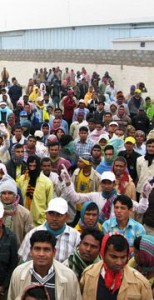By David Phinney
May 23, 2007 — Reuters: The war in Iraq is killing nine civilian contractors a week on average, roughly three times the rate of last year, and U.S. government statistics show that non-Americans do most of the dying.
No single government agency keeps track of how many nationalities work alongside the U.S. military but officials say the overwhelming majority are Iraqis and TCNs (third country nationals) from developing nations as far apart as Chile and Nepal, Colombia and India, Fiji and El Salvador.
 They also come from the Philippines. Reuters mentions the “official” count of 7,000, but some estimate the number of Filipino workers to be as large as 20,000. In fact, of the 120,000 or so contractors working in Iraq, perhaps two-thirds or more are referred to as third country nationals, or TCNs.
They also come from the Philippines. Reuters mentions the “official” count of 7,000, but some estimate the number of Filipino workers to be as large as 20,000. In fact, of the 120,000 or so contractors working in Iraq, perhaps two-thirds or more are referred to as third country nationals, or TCNs.
TCNs flooded in for work after the 2003 invasion. The money was sometimes better than they could make elsewhere, between $400 to $800 a month. Many were recruited by Mideastern subcontractors in a labyrinthian hiring practice.
Because of the dangers, the Philippines, India and Nepal all imposed labor bans on their workers traveling to Iraq. Some laborers went for the money and were smuggled in by their employers. Others were coerced and pressured after paying high recruitment fees for jobs in countries neighboring Iraq. Some had their work contracts sold from employer to employer.
Filipinos make up one of the largest single groups — 7,000 by one count — and have been among the most vocal in complaining over disparity of pay and of working conditions inferior to those of contractors from the United States and other Western countries.
Two years ago, hundreds of Filipinos staged a strike at a U.S. camp at Taji north of Baghdad.
Complaints about low pay — in many cases a fraction of what U.S. and other Western contractors make — and poor conditions have also come from Ugandans, Chileans and Colombians.
“There is globalization … as the companies simply look for the most cost-effective way of doing things,” said Doug Brooks, president of the International Peace Operations Association, a trade group for 35 private security companies.

